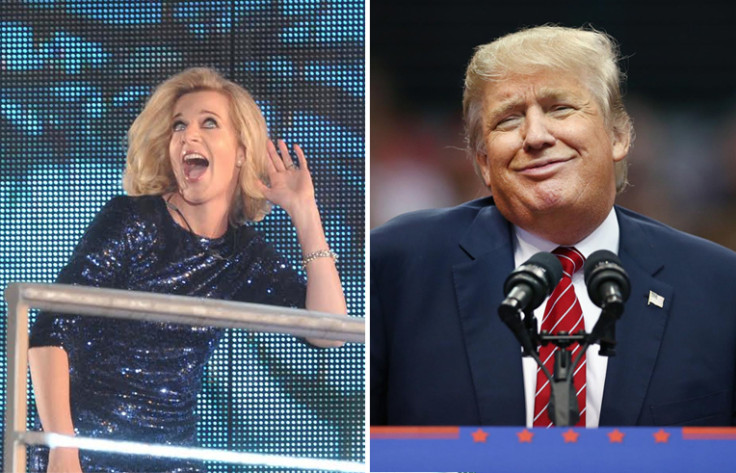Katie Hopkins and Donald Trump: You aren't brave free speech pioneers fighting 'political correctness'

I can't imagine there are many people less at risk of being silenced than Donald Trump. A walking, talking YouTube comments section with an unconvincing hairdo – the billionaire beauty pageant magnate is currently leading the field in the race for the Republican US presidential nomination.
Even before the launch of his political career, Trump did not struggle to attract media attention. Since he announced his candidacy, his every idiotic utterance has been dutifully reported by newspapers across the globe.
Every nasty, dimwitted, little brain-trump is pored over and analysed by political commentators of all persuasions. Every fatuous soundbite Vined, memed and endlessly retweeted. Short of withdrawing to a wifi-less mountain cabin and opting out of society entirely, it is extremely difficult to avoid discovering what Trump thinks of Muslims, Mexicans and Hillary Clinton's marital relations, no matter how uninterested you happen to be.
This is the undisputed reality of the situation. However, such trifles as concrete facts haven't prevented free speech crusaders rushing to Trump's defence against the latest imagined threat to a powerful white man's unimpeachable right to demonise minorities: a sardonic petition calling from him to be banned from the UK.
Satirical statement
Never mind that said petition is probably better understood as a satirical statement on Trump's own call to bar Muslims from entering the US, including those who'd just popped out for a holiday or to serve in the US Armed Forces. And on Theresa May's enthusiasm for closing our borders to Islamic "hate preachers" and African-American rappers with dubious gender politics. Never mind that, in the highly unlikely event of its success, Trump's freedom of expression still won't be limited in any meaningful way.
Among a certain subset of the structurally privileged, there's a particular, self-righteous hunger to find something to feel oppressed about. This appetite is so strong that even an entirely ineffectual petition against a the loudmouthed, scarily well-supported billionaire can be twisted into a Serious Freedom of Speech Issue and debated accordingly.
Inevitably, Katie Hopkins has taken to the pages of the Daily Mail to comment on the ongoing fracas. Another mysteriously unsilenced alleged victim of the PC police, Hopkins isn't quite delusional enough to claim the petition poses a real threat to Trump. Instead, she calls out the BBC for failing to adequately represent the bigot demographic in its coverage of his ludicrous statements.
It doesn't seem to have occurred to her that, with her national newspaper column, TV chat show and radio programme, she's pretty much got that covered herself. Not that she's having to go it alone. The UK's most popular tabloid has been keen to lend a hand, having recently published a misleading front page that seemed deliberately designed to stoke Islamophobia.
Favourite pastimes
Really, it's fortunate that the state broadcaster does exist to balance out the kind of venom spewed by Hopkins – who once described refugees as "cockroaches" – at every available opportunity. Impartiality doesn't require the BBC to give equal consideration to "each side" in the debate over whether 1.6 billion Muslims globally should be treated as collectively responsible for terrorism. There's only one possible answer to that question that isn't entirely ridiculous.
Far from being suppressed, blathering on about disliking Muslims has become a favourite pastime of a decent chunk of the population. Badly compressed Facebook image macros scaremongering about refugees, Sharia law and impending terrorist attacks have become something of an in-joke among those young, educated and urban enough to know better, but white enough not to feel targeted.
Undeniably, media hatemongers such as Hopkins et al know their audience. They argue they're just saying what many people are already thinking. That they're giving their audience what they want. That critics are trying to deny media representation to people whose opinions aren't considered politically correct enough.
The reality is more complex. Publishing generalisations about Muslims doesn't just pander to readers' existing prejudices, it also fuels them. There's little evidence for Hopkins's claim that we've "lost control of vast swathes of our country", which is why she doesn't really try to provide any.
Her suggestion that British Muslims aren't "denouncing terrorism" seems particularly bizarre given thousands of people participated in an anti-Islamic State (Isis) march just last week. But for a reader in 94.1% white Tunbridge Wells who last visited London in 1972 and can count the number of conversations they have had with a Muslim person on one hand, her ludicrous assertion might confirm their worst fears.
Maintaining illusions
In some ways, things like the petition to ban Trump play into the hands of people like Hopkins. Her career is built on presenting herself as a brave, free speech pioneer, standing up against the authoritarian, politically correct powers that be. That's a difficult illusion to maintain when you are, as Hopkins is, about as embedded in the media establishment as it's possible to be. Far from being dangerous and subversive, saying the things she does is actually highly profitable.
These fictional battles over what you can and can't say also provide a useful distraction from far more pressing questions. You might have the right to use your giant media platform to encourage a dislike and distrust of Muslims, but should you? When Hopkins states she doesn't "buy into the clear divide between extremist Muslims and peaceful ones", it's obvious what she's suggesting. The controversial comments are less dog-whistle and more full-scale marching band.
Is it morally justified to use media influence to stoke the kind of Islamophobic paranoia that recently reportedly caused a man to be forced off the Tube for the crime of "using an iPad suspiciously"?
Free speech concerns aside, it's hard to deny that the world would be a nicer place if people like Hopkins and Trump would just shut up of their own accord.
© Copyright IBTimes 2024. All rights reserved.






